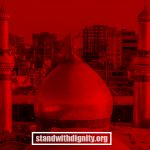By Fatima Kermalli
Imam Hussain ibn Ali stated, “People are slaves to the world, and as long as they live favorable and comfortable lives, they are loyal to religious principles. However, at hard times, the times of trials, true religious people are scarce.”
In terms of the many aspects of worldly life, these words ring true as they are spoken by one of the immaculate individuals who has traversed the land, Hussain ibn Ali (as), the grandson of Prophet Muhammad (p). He was martyred on October 10, 680 A.D., which corresponded to the tenth day in the Islamic month of Muharram, termed as Ashura. His martyrdom is commemorated every year all over the world due to the sacrifices he gave to uphold truth as he preached the same. He said on the Day of Ashura, “Don’t you see that truth has been replaced by falsehood? We must be prepared to sacrifice everything that is precious in support of Truth!”
In relation to climate and the environment, Imam Hussain’s (as) above saying is also quite relevant because people want the luxury of life not realizing it has its consequences. Today and in past years, people have become oblivious to the destruction of the environment that is done due to the many life conveniences that exist. From foam cups, water bottle to the excessive fossil fuel emissions are all a part of the many elements that contribute to climate change and environmental pollution. Last year global carbon emissions increased by 2.7%, hitting a record high of 37.1bn tons.
Thus, humanity must limit the total amount of greenhouse gases (270 PgC) that they emit for the remainder of this century in order to limit the Earth’s warming to 2°C. Unfortunately, it has been that the last three decades has been warmer than all previous decades since 1850. Furthermore, the first decade of the 21st century has been the warmest. Studies show we are on the path for extremely dangerous temperature rise, and an increase in emissions that would alter the climate dramatically.
What is more, it is important to utilize lawful means to reach a goal in bettering our world. Imam Hussain (as) had said: “Those who use unlawful means to achieve their objectives never attain them.” In order to achieve a stabilization in the climate system, it is important to unite across the globe and work equitably with one another. Nations must work towards the common good and not deplete the Earth’s resources unjustly to increase wealth. Furthermore, exploitation of the lands of other nations and their people must cease as it is unlawful and with such prosperity that is attained, will never last.
Another lesson demonstrated on the day of Ashura is giving preference to the needs of others. This was depicted repetitively through the journey that led to Karbala as well as during the event of Karbala. Imam Hussain (as) offered water to others who were thirsty; though days later, he himself would be deprived of water. His brother, Hadhrat Abbas relinquished the ability to drink the water once he reached the river because the children had not yet had water and he aimed instead, to take the water back to them.
Similarly, it is important for the industrialized nations to begin to act altruistically towards those developing nations who are limited in resources and live a far more meager lifestyle. The small islands and low-lying coastal countries are more susceptible to the unfavorable effects of climate change, as they may become extinct if the average temperatures are not kept below 1.5°C above pre-industrial levels. Thus, if oil and gas producing countries are able to switch much of their energy to renewable’s locally, they would need to keep their fossil fuel reserves untapped and unsold in order for these island states to survive. It would be an act of compassion to care for others who are not so fortunate over one’s own betterment.
Imam Hussain (as) stated, “Act in this world like a person who knows that he will definitely be rewarded for good deeds and punished for sin and crimes.” Understanding this is understanding that we all leave footprints on the earth that will affect the future of the planet and generations to come.
Earlier last week, the United Nations held a Climate Summit, yet it was a young girl of 16 years of age, Greta Thumberg, a Swedish environmental activist on Climate Change, who understood the concept of footprints; hence, spoke firmly against the world leaders who have been playing a passive role toward climate change. Regardless of any repercussions that she may face; yet, she strove towards doing good, seeking for a better outcome regarding climate change.
The lessons of Karbala are lessons that are applicable today and will continue to be till the end of time; thus, following these teachings can help us to preserve our planet.











